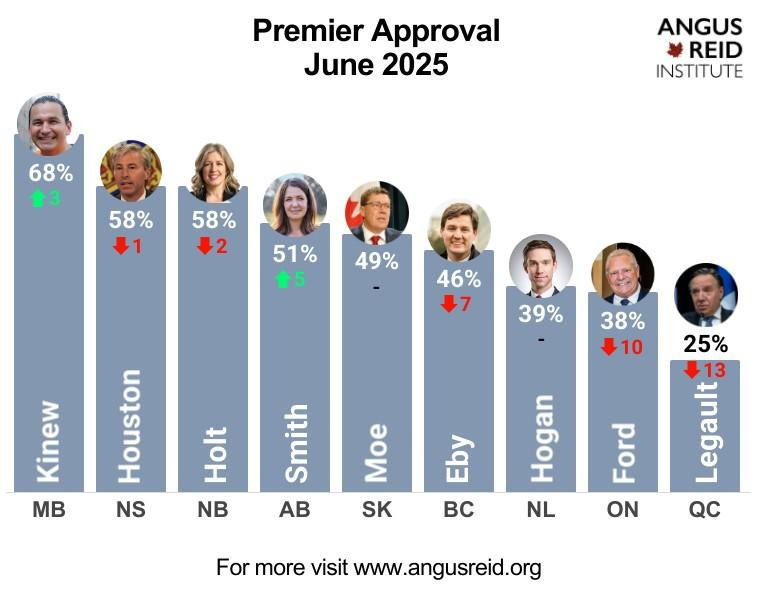Smith posts biggest approval gain among premiers: poll
Alberta Premier Danielle Smith received the largest approval rating gain of any Canadian premier this quarter, as she reached an all-time high since taking office in 2022.
Alberta Premier Danielle Smith received the largest approval rating gain of any Canadian premier this quarter, as she reached an all-time high since taking office in 2022.
According to an Angus Reid Institute poll released Thursday, only the premiers of Alberta and Manitoba saw increases in approval. Conversely, British Columbia’s David Eby, Ontario’s Doug Ford and Quebec’s François Legault were among the biggest losers this quarter, with two of the three premiers seeing double-digit drops.
Smith’s approval rating rose five points to 51 per cent, her highest since becoming premier late in 2022, when it stood at 42 per cent.
Smith’s record approval rating coincides with separatist sentiment potentially having its strongest ever support.
Speaking at a Wednesday news conference, Smith said that her internal polling has shown separation numbers as high as 37 per cent. She discussed her demands for the Liberal government and the potential revolt if they’re disregarded, along with a pipeline.
“I hope the Prime Minister doesn’t want to test it because I take it seriously. I have never seen separatist sentiment be as high as it is right now,” said Smith. “I don’t know if it’s ever been that high. But again, I’ve also seen it dissipate when Ottawa addresses the legitimate concerns Alberta has. And I’m not kidding that the nine demands are my short list.”
The poll also found that Smith is Canada’s most polarizing premier, with 32 per cent of Albertans strongly approving of her performance and 37 per cent strongly disapproving.
Only Smith and Kinew have at least one-third of residents strongly approving of their performance. Conversely, Smith and Legault are the lone premiers with more than one-third of residents strongly disapproving of their performance.
Kinew, meanwhile, tops the national rankings by a country mile with 68 per cent approval, up three points. The Manitoba premier earned praise for his handling of the province’s wildfire crisis and for positioning Manitoba as a potential hub for energy infrastructure.
“His ‘centrist political balancing act’, as some have called it, has helped maintain his personal popularity,” reads the report.
“In British Columbia, David Eby is also down seven points as he and Ford both defend controversial legislation passed to speed up infrastructure projects,” the poll noted.
Legault recorded the sharpest drop of any premier, falling 13 points to just 25 per cent approval, his lowest on record.
“For the first time since 1995, Standard & Poor (S&P) downgraded Quebec’s credit rating in April, citing concerns over persistent deficits and lower government revenues,” the report stated. “Premier François Legault took ‘full responsibility’ but argued his government’s spending decisions have been justified.”
In the Canadian Taxpayer Federation’s annual performance report card, Quebec’s finance minister was given a D- (though most provinces fared no better).
Legault’s government is also facing mounting scandals and economic setbacks, including a failed $270-million investment in an electric battery plant, a resurgent Parti Québécois challenging his nationalist credentials, and fierce opposition from Quebec doctors over pay reforms.
Ford saw a 10-point decline, dropping to 38 per cent approval, following backlash to Ontario’s new Bill 5. The legislation would create “special economic zones” exempt from many provincial regulations. Ford’s strong approach to the U.S.-Canada tariff war could have impacted his ratings, too.
“Ford has consistently been closer to the bottom of the premier rankings than the top during his tenure,” reads the study.
Eby’s approval rating fell seven points to 46 per cent amid criticism over two controversial bills—Bill 14 and Bill 15—aimed at fast-tracking clean energy and major public-interest projects.
Opposition parties have argued that the bills grant the B.C. NDP sweeping powers at the expense of transparency, environmental oversight, and Indigenous rights.
The survey was conducted online from June 2 to 8, 2025, among a randomized sample of 4,067 Canadian adults.







Smith is just another manipulative opportunistic politician, yet people still vote .I cannot believe the stupidity of most Canadians
I am 100% on Smith’s side. She wants the best for Alberta and Canada. ♥️